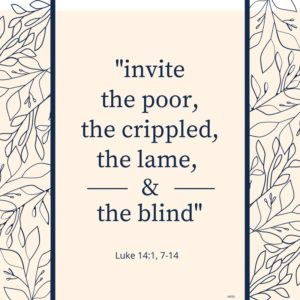The Pastor’s Page June
10 “But when you are invited, go and sit in the lowest place, so that when your host comes he may say to you, ‘Friend, move up higher.’ Then you will be honored in the presence of all who sit at table with you. 11 For everyone who exalts himself will be hum- bled, and he who humbles himself will be exalted.”—Jesus, Luke 14:10-11

Last year, throughout Lent and Easter, we studied Jesus’ teaching in the Upper Room in the Gospel of John. There Jesus’ exemplifies His life and ministry in washing the feet of the disciples and then commanding them to go and do likewise for one another (see John 13:1-20). This year, we are studying the way of the Cross in the Gospel of Mat- thew where Jesus’ calls us to bear fruit for the kingdom even in the midst of turmoil and tribulation (see Matthew 24:15-35).
Throughout the Gospels, amidst their subtle differences, there stands a common theme: to serve and to love as our Savior did. We see that same truth conveyed in the Gospel of Luke. The verses above come from the lips of Jesus just after He witnessed individuals trying to elbow their way to the places of prominence at a dinner party.
Jesus was telling them that our faith is not to be self-serving. After all, that is what the world does. We are taught in a social media saturated world to create ‘content’ that generates ‘likes’ and‘followers. ’ At the same time, we are told to be ‘authentic’ as this will aid in accomplishing those artificial goals.
The irony is this: in order to be ‘authentic’ we have to often cultivate a false persona. Anyone who has spent any time on social media soon learns that being your true self can create all sorts of opposition.
The same is true in real life. Being genuine creates opposition. Take a stance, any stance, and people will voice a contrary opinion. I’ve seen arguments erupt in groups simply around choosing where to eat lunch during a retreat or what color to paint a particular room. Sadly, this occurs in churches too. I heard of a church whose membership divided over how to spend a bequeath from a dear saint who had gone to be with the Lord.
Imagine the opposition that would be generated from telling people that they are not the center of the uni- verse, the focal point of the church, or even the one to receive the limelight. Well, if you have a Bible handy, you don’t have to imagine. Simply read chapter 15 of the Gospel of Luke.
In Luke 15, we have one of the most beautiful pieces of scripture, the Parable of the Lost. In that parable, Jesus tells of a lost sheep, a lost coin, and a lost son—actually there are two lost sons. He tells the parable because He is actually living out His own teaching—imagine that!
When Jesus taught of taking the lowly seat, He was talking about sitting down and enjoying a meal with people that no one else wanted to be around.

When Luke 15 opens, Jesus is enjoying the company of tax collectors and sinners. Even worse, the neighbors—I mean the Pharisees and scribes—found out, and they grumbled about Jesus’ humility—His willingness to “receive sinners and eat with them” (v 2). In response, Jesus told them the Parable of the Lost Sheep, Coin, and Son(s). In fact, scripture is utterly clear (v 3), this is ONE parable and needs to be heard as such. We all know what it means to lose a sheep (livelihood), a coin, car keys, or the re- mote. We’ll scour the house and do everything in our power to reclaim the lost ‘stuff.’ The challenge of the parable: would we do the same for a lost soul?
Do we allow others the privilege of having the place of honor? That’s one of the reasons I park so far from the church building. Early on, when I first arrived here, someone actually told me in the parking lot, “I know why you park there.” I smiled. He smiled. Most people assume it’s because I need the exercise, which is my usual answer when asked. (Believe it or not, most people—even church members—don’t want the theological answer).
As we shift into June and slowly emerge from our quarantined bunkers—I mean homes—how shall we re- turn? Will we feel like a church family when we cannot embrace or even shake hands? Will we come seeking com- fort for ourselves? Will we gather to find our place in the church? Or will we gather in humility to serve one another, comfort one another, and allow others to sit in the place of honor in the sanctuary or to park in the primo spot?
More radically, when we seek to shift into high gear, will we clamor to have our favorite ministry or program to be restarted? Will we want what’s best for ourselves or those closest to us? Will we divide into cliques trying to divide the pie? Or will we humble our hearts before God and seek for a new and radical way to ‘do’ Church? Will we come seeking to comfort rather than to be comforted?

Will we come seeking to feed others rather than worry how much we are being fed?
Will we gather to not only be hearers of the Word but also doers (see Romans 2:13 AND James 1:22-25)? This has been a challenging season, which is a sever understatement! One denominational leader predicted to me recently that churches may end up being closed until September and a second round of closures may come again later this year or in the first half of 2021.
What does such a future look like for St. John’s and other churches in our communi- ty? How will we be the Church when re- sources grow scarce and fatigue enters our souls? How will we love our neighbor when we do not feel like getting out of bed in the morning or when our own family’s needs seem overwhelming?
Thomas Paine in the founding days of our nation said, “These are the times that try men’s souls.” Go and read the rest of the quote. For there, he speaks of those who endure and follow through in spite of difficulty will be justly rewarded. Jesus teaches likewise as we have been seeing in the Gospel of Mat- thew—those who endure to the end will be saved (Matthew 24:13).
So when we gather again, may we do so in love. May we gather to build up the church and encourage one another. May we continue to bless our sisters and brothers who may not be able to be with us physically. Even more, may we reach out and preach the Gospel in love and ser- vice to our neighbors in this community. May we be humble enough to love and serve them as Christ did and as He commanded.
In humble service,
Pastor Randall

